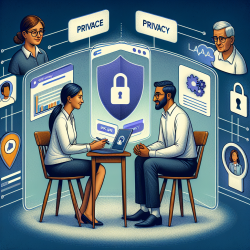The COVID-19 pandemic brought about unprecedented changes in the way therapists conduct psychological assessments and therapy sessions, particularly for those working with individuals with mild intellectual disabilities. The study "Experiences of therapists conducting psychological assessments and video conferencing therapy sessions with people with mild intellectual disabilities during the COVID-19 pandemic" by Oudshoorn et al. provides invaluable insights that can help practitioners enhance their virtual therapy skills.
Key Findings from the Study
The study identified five main themes that encapsulate the experiences of therapists during the initial lockdown period:
- An Immediate Transition to Virtual Working: Therapists had to quickly adapt to using video conferencing tools, which required developing new digital skills and overcoming various logistical challenges.
- Developing Virtual Ways to Support Service Users: Practitioners had to innovate to help service users cope with COVID-19-related stress and continue their therapy.
- Lacking the Appropriate Equipment: Many therapists and service users faced technical difficulties due to inadequate equipment and unstable internet connections.
- Limitations in Virtually Attuning to Service Users: Conducting sessions remotely posed challenges in reading non-verbal cues and maintaining engagement.
- Unforeseen Opportunities: Despite initial hurdles, therapists discovered unexpected benefits, such as improved accessibility and the ability to gain insights into the personal lives of service users.
Implementing the Study’s Findings
To improve your virtual therapy sessions, consider implementing the following strategies based on the study’s outcomes:
- Enhance Digital Skills: Invest time in learning how to use video conferencing tools effectively. Familiarize yourself with all available features to optimize your sessions.
- Prepare in Advance: Send necessary materials to service users before the session. This could include workbooks, questionnaires, or creative supplies like paints and clay.
- Ensure Proper Equipment: Advocate for better equipment for both therapists and service users. Stable internet connections and larger screens can significantly improve the quality of sessions.
- Involve Stakeholders: Engage family members and support staff in the sessions to provide additional support and facilitate better outcomes.
- Explore Creative Solutions: Use visual aids and interactive tools to make sessions more engaging, especially for service users who struggle with verbal communication.
Encouraging Further Research
While the study offers a solid foundation, more research is needed to explore the long-term effectiveness of video conferencing therapy for individuals with mild intellectual disabilities. Practitioners are encouraged to contribute to this growing field by sharing their experiences and findings.
To read the original research paper, please follow this link: Experiences of therapists conducting psychological assessments and video conferencing therapy sessions with people with mild intellectual disabilities during the COVID-19 pandemic.










